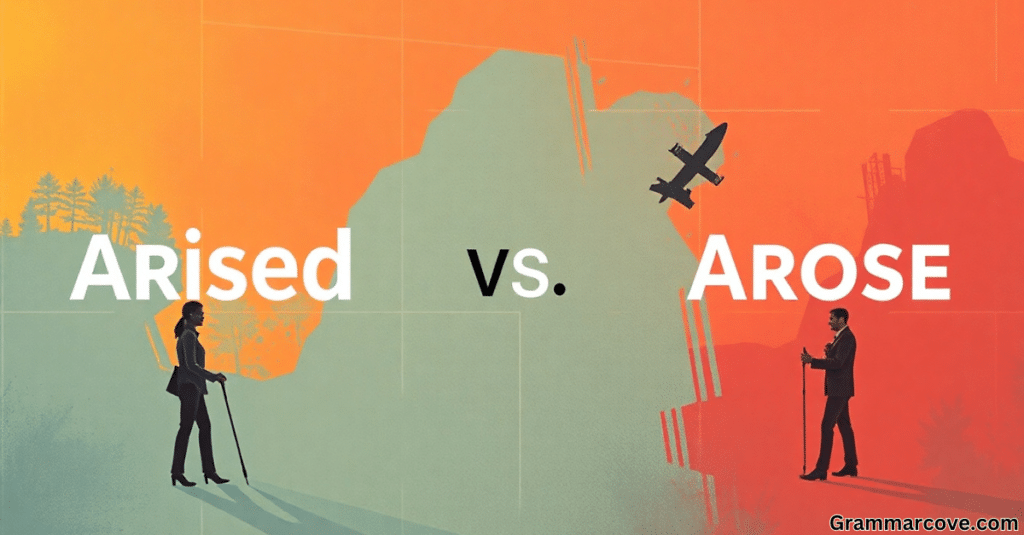In the world of English grammar, one of the most common sources of confusion lies in the conjugation of irregular verbs. One such verb that often causes debates is “arise.” If you’ve ever stumbled upon the question of whether to say “arised” or “arose,” you’re not alone. English learners and even native speakers sometimes trip over these irregular forms. But don’t worry! This article will clear up the confusion and help you understand the correct past tense of arise—and why it matters.
What Does Arise Mean?
Before we get into the intricacies of its past tense, it’s important to first understand the verb “arise” itself. To arise means to come into being, to appear, or to occur. It’s typically used when something emerges or manifests itself, often unexpectedly. For example, if a problem arises, it means that it appears or comes to attention.
Arise Synonyms
- Emerge
- Occur
- Appear
- Surface
- Develop
- Manifest
- Originate
These synonyms give you a better sense of how the verb “arise” functions in different contexts. Now that we have a clear understanding of the verb itself, let’s dive into its past tense forms.
Arised or Arose: What’s the Correct Past Tense of Arise?

The short answer: “Arose” is the correct past tense form of “arise.” “Arised” is simply incorrect in modern English grammar.
Let’s break down why this is the case by exploring the verb’s historical roots and its conjugation patterns.
Past Tense Forms of Verbs: The Case of “Arise”
“Arise” is an irregular verb, which means it doesn’t follow the standard rules for forming past tenses. For most regular verbs, you simply add -ed to the base form (e.g., “talk” becomes “talked”). However, irregular verbs like “arise” don’t follow that rule and instead form their past tense through different changes. For “arise,” the past tense is “arose.”
Examples of “Arise” in Sentences:
- Problems arise when expectations aren’t clearly communicated.
- Opportunities arose after the new policy was introduced last year.
The Roots of “Arise”: A Historical Look
To fully appreciate why “arose” is correct, let’s consider the historical development of the word. “Arise” comes from the Old English word “arīsan,” which had a similar meaning of “to rise up” or “to appear.” The verb underwent changes through the centuries, influenced by both Old English and other Germanic languages. The shift from “arīsan” to modern-day “arise” involved a variety of conjugation changes, which explains why “arise” doesn’t follow the regular pattern seen with simpler verbs.
The past tense form, “arose,” comes from an even earlier stage in English, known as Middle English.
The Debate: Arised vs Arose

Now that we know the past tense of “arise” is “arose,” let’s explore why people sometimes use “arised” instead. This mistake likely arises from the way some people incorrectly apply regular verb rules to irregular ones. Since many verbs end in -ed in their past tense, it might seem logical to add -ed to “arise” to form “arised.”
However, “arised” is a common mistake. There’s simply no place for it in standard English grammar.
Why “Arised” is Wrong
Here’s a breakdown of why “arised” doesn’t work:
- “Arise” is an irregular verb, and irregular verbs do not follow standard conjugation rules.
- Irregular verbs typically change in unpredictable ways. For example, the verb “rise” becomes “rose” in the past tense, just as “arise” becomes “arose.”
- Even though “arised” might seem logical to some, it doesn’t fit with the established patterns for this particular verb.
How to Use Arise in the Past Tense
Knowing the correct past tense form—“arose”—means you can confidently use it in your writing and speaking. Below are a few examples to help illustrate the correct use of “arose” in different contexts.
Example 1: In an Email
Imagine you are writing an email to a colleague, Alex, to explain a recent issue with a project.
Subject: Update on Project Timeline
Hi Alex,
I hope you’re doing well! I just wanted to let you know that some unexpected challenges arose with the budget allocation, which has pushed back the project timeline a bit. We’ll need to discuss the new deadlines during tomorrow’s meeting.
Let me know if you have any questions!
Best,
Emily
In this example, “arose” refers to the problems that appeared or developed during the course of the project. It’s the proper use of the past tense of “arise.”
Example 2: In a Formal Report
Let’s say you’re drafting a report about customer complaints that have arisen over the last quarter.
Quarterly Customer Satisfaction Report
Over the last quarter, several issues arose regarding product quality and delivery times. These concerns were promptly addressed by our customer service team, and we implemented changes to improve our processes.
Here, “arose” is used to indicate the problems that occurred or manifested during a specific time period.
Rise vs Arise: What’s the Difference?
You may have also encountered the verb “rise” and wondered whether it’s interchangeable with “arise.” While both verbs convey a similar idea of something going upwards or coming into being, they are not identical. Let’s look at the differences.
Rise vs Arise
- “Rise” generally refers to something physically moving upward. For example, the sun rises in the morning. It is a more straightforward, physical action.
- “Arise” is often used in more abstract or figurative contexts. It means to come into being, to occur, or to appear. For instance, “difficulties arise when expectations aren’t set clearly.”
The Past Tense Forms
- The past tense of “rise” is “rose”: “The sun rose at 6 a.m.”
- The past tense of “arise” is “arose”: “Several issues arose during the meeting.”
Verb Conjugation Rules and Irregular Verbs
In English, many of the most commonly used verbs are irregular, meaning they don’t follow the typical pattern for forming past tense. Some other irregular verbs include:
- Go → Went
- Begin → Began
- Take → Took
Knowing how to conjugate these verbs properly requires memorizing their irregular forms, since there’s no easy formula to follow.
Common Irregular Verbs
| Base Verb | Past Tense | Past Participle |
|---|---|---|
| Arise | Arose | Arisen |
| Rise | Rose | Risen |
| Go | Went | Gone |
| Begin | Began | Begun |
| Take | Took | Taken |
It’s worth noting that some irregular verbs are used in both transitive and intransitive ways, meaning they may or may not take an object. For instance, “arise” is intransitive, as it doesn’t require an object (e.g., “Problems arise” vs. “I arise the issue”).
Usage of “Arise” in Context

When learning about irregular verbs and their past tense forms, context is key. Here are a few more examples to help you get a better feel for the usage of “arise” and “arose.”
- Problems Arise
- Problems arise when expectations aren’t clearly communicated.
- Last week, a few issues arose that we’ll need to address in our next meeting.
- Opportunities Arise
- Sometimes, unexpected opportunities arise when you least expect them.
- New business opportunities arose after we launched the new product line.
Conclusion: Arose vs Arised
To wrap up, if you’re asking yourself arised or arose, the answer is clear: “Arose” is the correct past tense form of “arise.” “Arised” is a common mistake that many people make, but it has no place in standard English grammar. By understanding the historical development of the verb and familiarizing yourself with common irregular verbs, you’ll be able to use “arise” confidently and correctly in any context.
Remember, irregular verbs like “arise” don’t follow standard patterns, so learning these exceptions is key to mastering English verb tenses.


